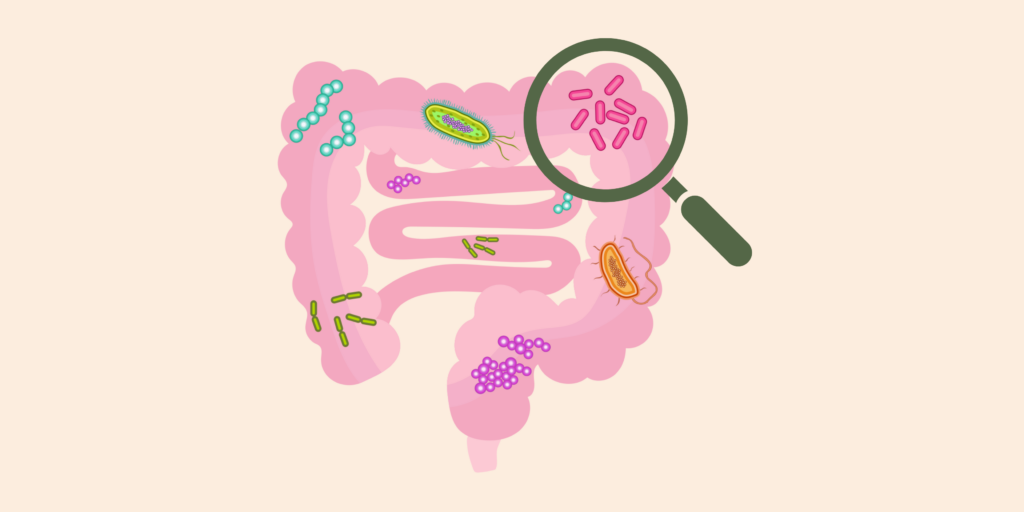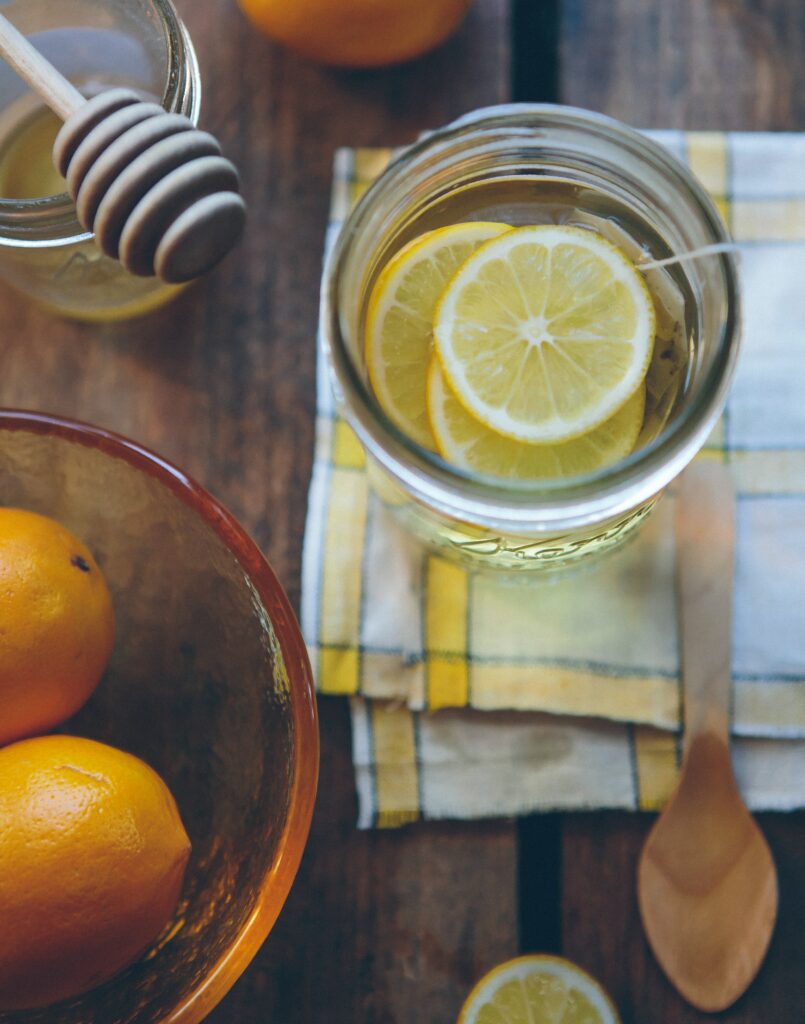By: Jillian Sampaio, RD, LDN / Last Updated On: March 8, 2024
Reviewed By: Gabrielle McGrath, MS, LDN, RD

What is Gut Health?
Did you know that researchers have just begun diving deep into understanding our gut microbiome within the past few decades?
The scientific focus on gut health and human microbiota has tremendously grown due to its contributing role in short- and long-term health. There are trillions of living microorganisms living inside our gut microbiota.
Our gut health impacts our physical, mental, immune, hormonal, and thyroid health. Its primary role is to digest and absorb nutrients to become more readily available for our body to use them.
However, there’s way more to our gut health than we think. Our gut constantly communicates with our brain and nervous system, directly impacting our emotions, mood, sleep, and metabolism. It can also affect our liver, responsible for the filtration and detoxification of toxins in our body. Lastly, it impacts our digestion and gastrointestinal (GI) health.
What Factors Impact Gut Health?
Poor gut health is associated with GI discomforting symptoms such as abdominal pain, bloating, diarrhea, constipation, acid reflux, nausea, or vomiting.
Discovered more recently, poor gut health is associated with other non-GI-related symptoms such as brain fog, low libido, skin issues, and fatigue.
So what impacts our gut health? Some of the many underlying factors contributing to GI issues are exercise, sleep, injuries, stress/trauma, diet, medications, and genetics. Even toxins (heavy metals and chemicals), mold, and viral infections.

There are three main contributors to gut issues: emotional stress, dietary stress, and hidden inflammation in the gut.
Emotional and Dietary Stress
Individuals who are under chronic stress may find themselves eating poorly or overeating which ultimately steering them away from having a balanced diet. Therefore, increasing risk for impairing metabolism (slowing it down), nutrient absorption, the mucosal barrier, increasing gut inflammation, and impacting bowel movement (constipation, diarrhea, chronic bloating, etc.).
Emotional stress can include any stressors in your life, such as the loss of a loved one, a traumatic event, or relationship/work/financial situations.
Dealing with emotional stress can shift us towards unwanted symptoms such as poor sleep and harmful coping habits (smoking/drinking), which can put an even more significant strain on our stress levels.
Dietary stress can also significantly impact our gut health. This includes food intolerances, allergies, and blood sugar imbalances. When we consume foods that our body cannot break down and digest, it overworks our GI system.
High consumption of refined and heavily processed carbohydrates can spike blood sugar levels, creating an imbalance that will further cause spikes in insulin and cortisol. Over time this can lead to insulin resistance and put you at risk for health complications.
Inflammation
Common infections in the gut occur from viruses, yeast, bacteria, or parasites. This is one of the main reasons you may be experiencing hidden inflammation in the gut which leads to unwanted symptoms.
However, there is a solution; a proper GI test and analysis can confirm the presence of any viral, bacterial, or enzymatic imbalances. Get yours completed today at Wellpower Method.
How Do You Improve Your Gut Health?
Incorporate Gut-Friendly Foods
Probiotics
Probiotics are live microorganisms (bacteria or yeast) that are beneficial when consumed. Think of it as the “good” and “healthy” bacteria for our gut.

Sources of Probiotics (Fermented Foods):
- Sourdough bread
- Kimchi
- Kombucha
- Yogurt (check for live cultures in ingredients)
- Kefir
- Sauerkraut
- Tempeh
- Pickles
**Note: It is recommended to gradually introduce probiotics into your diet since you’re changing up your gut microbiota. People who jump into a large consumption right away can experience bloating, gas, and diarrhea.
Prebiotics
Prebiotics are a non-digestible form of fiber that goes through fermentation in the colon and that the gut microbes then feed on. In other words, it’s the food source for probiotics!
Sources of Prebiotics:
- Whole-grain foods (bread, quinoa, oats, etc.)
- Beans/legumes
- Bananas
- Asparagus
- Onion
- Garlic
- Chicory
- Artichokes
- Leeks
Together, this iconic duo helps maintain a healthy balance and growth of beneficial bacteria in our gut. They also can help fight off harmful bacteria when there is overgrowth.
Be sure that when you are searching for these “gut healers” in the grocery store you look for brands that avoid additives like added sugars and fats.
Let us not forget about fiber! In the US, the reported intake of fiber is only 50% of what it should be. Fiber keeps our bowel movement regular, keeps our blood sugar in check, regulates our hunger, and aids in nutrient absorption.
Prioritize Sleep and Hydration
I can’t emphasize it enough, get your minimum of 7 hours of sleep every night! According to John Hopkins Medicine, “lack of sleep impacts your memory, emotions, weight, and even your appearance.” Sleep is an underlying factor of several gut issues. Not only will your gut thank you, but you’ll feel better and look brighter!
Hydration is also crucial for optimal gut health. Adequate fluid intake helps regulate bowel movement, prevents constipation, and improves digestion. This is your sign to drink a cup of water right now!
Incorporate Daily Physical Activity
Exercise is essential to keep our bowel movements regular. It stimulates GI motility to keep things moving along (something to consider if you’re suffering from constipation and not moving too much).
I think we can all agree though that exercising makes us feel better after! In a study conducted in June this year, consistent exercise showed positive effects on reducing inflammation and intestinal permeability in the gut. The study also found an increase in healthy microbes in the gut.
Manage Stress
With stress being one of the key contributors to poor gut health, this is your sign to prioritize it! Do things you enjoy, have alone time, exercise, and have a healthful diet.
There are multiple tips and tricks out there for decreasing stress and incorporating healthy stress reducing habits into your life. Find great references and advice here.
Focus on a Nourishing and Balanced Diet
Variety is vital for your gut and overall health. Diversity of whole grains, healthy fats, protein sources, and colorful fruits and veggies is crucial in building a long-term healthy gut. Focusing on three meals a day that incorporate diversity ensures you are feeding and fueling your body appropriately.
The Bottom Line

Poor gut health may be the root cause of why you’re not feeling your best. Making simple lifestyle and dietary changes can aid in diversifying our gut flora to help keep it balanced and improve our digestion.
If you’re someone suffering from GI discomfort, unwanted symptoms, or just simply want to check up on the microbial diversity in your gut, consider getting a GI map done with Gabrielle founder of the Wellpower Method.
Join today and the Wellpower Method will provide you with the individualized treatment plan you need. A healthy gut means a healthy you!
References
- https://www.hopkinsmedicine.org/health/wellness-and-prevention/your-digestive-system-5-ways-to-support-gut-health
- https://www.frontiersin.org/articles/10.3389/fnut.2021.637010/full


